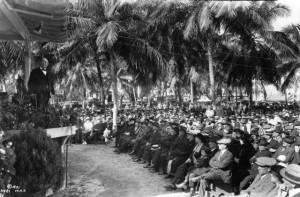Today marks the 90th anniversary of the start of the Scopes “Monkey Trial” in Dayton Tennessee. It’s one of the most famous events in the long running anti-evolution crusade here in America. In 1925, a biology teacher named John Scopes was arrested for teaching evolution, which had been outlawed by a Tennessee state law called the Butler Act. The Butler Act stated:
AN ACT prohibiting the teaching of the Evolution Theory in all the Universities, Normals and all other public schools of Tennessee, which are supported in whole or in part by the public school funds of the State, and to provide penalties for the violations thereof.
Section 1. Be it enacted by the General Assembly of the State of Tennessee, That it shall be unlawful for any teacher in any of the Universities, Normals and all other public schools of the State which are supported in whole or in part by the public school funds of the State, to teach any theory that denies the story of the Divine Creation of man as taught in the Bible, and to teach instead that man has descended from a lower order of animals.
Section 2. Be it further enacted, That any teacher found guilty of the violation of this Act, Shall be guilty of a misdemeanor and upon conviction, shall be fined not less than One Hundred $ (100.00) Dollars nor more than Five Hundred ($ 500.00) Dollars for each offense.
Section 3. Be it further enacted, That this Act take effect from and after its passage, the public welfare requiring it.
There were Florida connections to the Tennessee law and trial. Famous anti-evolutionist William Jennings Bryan, who served on the Scopes Trial prosecution team and became a prominent part of the proceedings, was a Florida resident at the time. He had bought land in Coconut Grove in 1912 and built a home there so that his wife, Mary, would have a winter retreat to help her health. By 1921 Bryan declared Florida his legal residence. At about that same time he took up the cause against the teaching of evolution, giving speeches, visiting universities and working with lawmakers. He praised University of Florida president Albert A. Murphree for being a leader “of a great university who has not been carried away by the ape theory.”
Bryan encouraged lawmakers in several states, including Florida, to craft laws that would outlaw the teaching of evolution as true. Florida legislators gave him something close to what he wanted, passing House Concurrent Resolution No. 7 in 1923. It stated, in part:
That it is the sense of the Legislature of the State of Florida that it is improper and subversive to the best interests of the people of this State for any professor, teacher or instructor in the public schools and colleges of this State, supported in whole or in part by public taxation, to teach or permit to be taught atheism, agnosticism, Darwinism, or any other hypothesis that links man in blood relation to any other form of life.
Bryan gave a two-hour speech in support of it to a joint session of representatives and senators. The resolution easily passed both chambers. However, it was a resolution, merely advising what lawmakers believed shouldn’t be taught. It wasn’t a law and so had no enforcement teeth.
Later, Bryan was irritated when he saw that no one took the resolution seriously. But before he could take any further action in Florida, he rode a train to Tennessee to participate in the Scopes Trial and died shortly after the trial ended.
After his sudden passing, the anti-evolution fervor in Florida spiked. The Bible Crusaders of America, headquartered in Clearwater, campaigned against textbooks that mentioned evolution. The organization claimed they weren’t against science but “against teaching of unproved guesses.” Their efforts succeeded. Florida replaced evolution friendly science textbooks with ones that didn’t mention the concept at all.
Evolution was once again a target in the Florida legislature in 1927. There was a fierce effort to pass an actual law like Tennessee had. The hot debates actually shut down the house for a day and dragged on past midnight. Ultimately, though, the effort failed. Then the anti-evolution momentum slowed for a while. But not for long.
If the Tennessee trial had never happened, there was a good chance it would have materialized in another state, possibly even Florida. The 1920s were a heady time for anti-evolution combatants across the country and there were plenty of such fighters to be found in the Sunshine State. Even now in 2015 there are agitators just waiting for an opportunity. Over the past 90 years there have been many fights here over the teaching of evolution and there will undoubtedly be more to come. Will Florida host the “next” Scopes Trial? It’s certainly a possibility.





